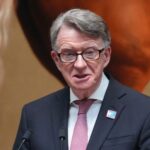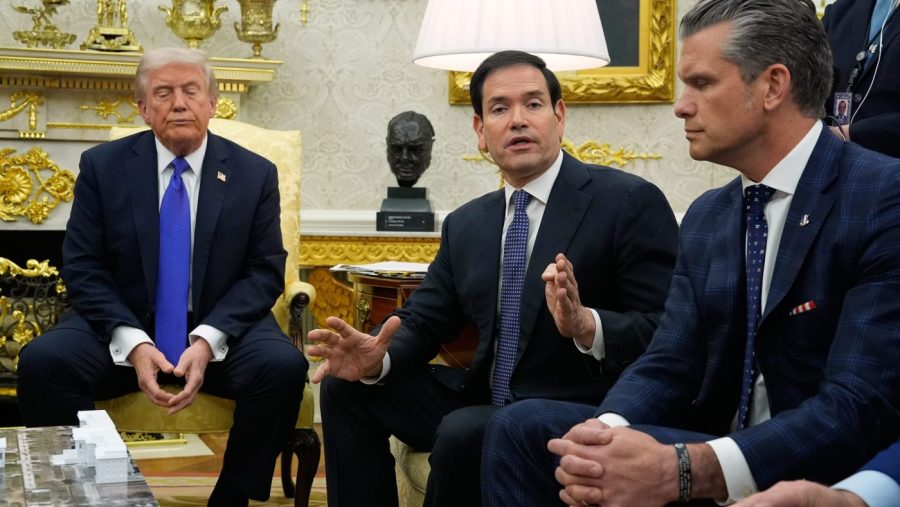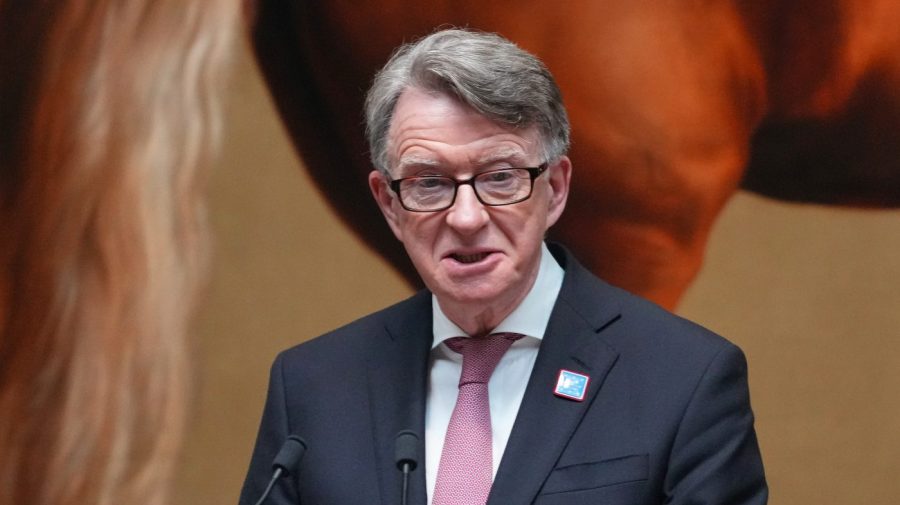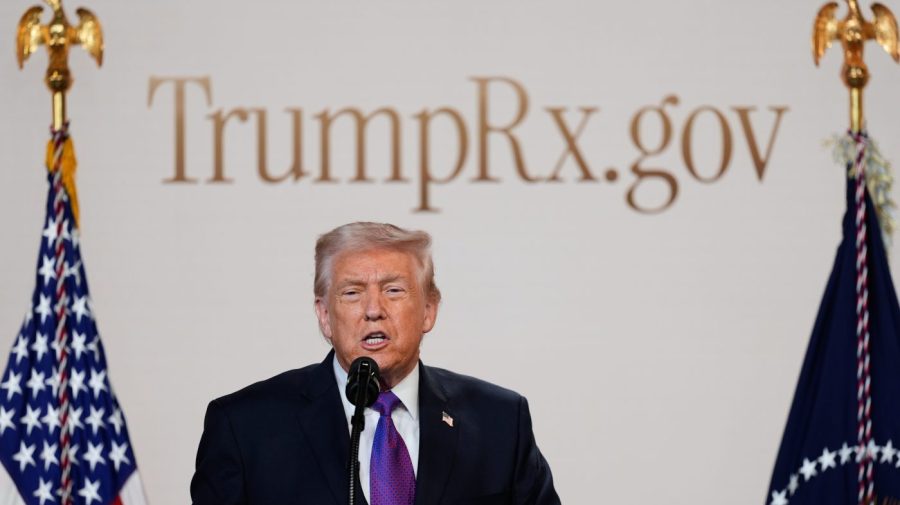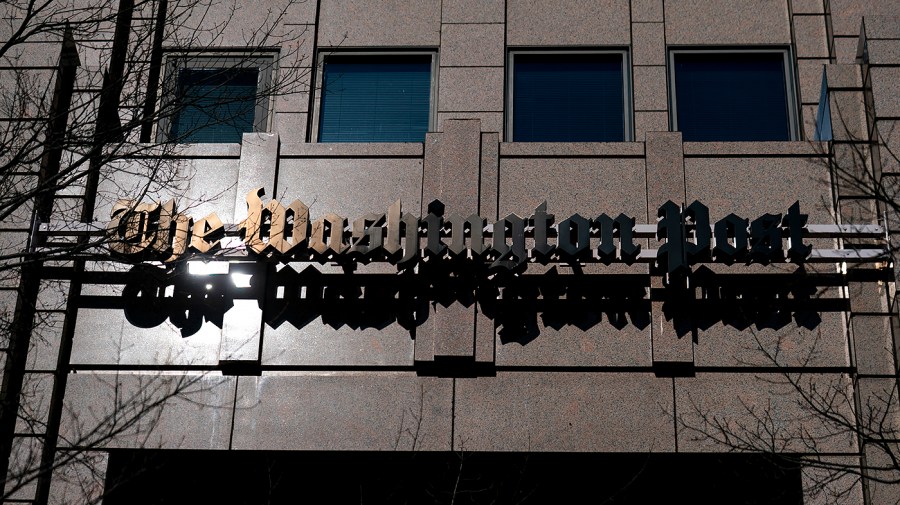
President Trump met with NATO Secretary General Mark Rutte at the White House on Wednesday, shortly after Treasury Secretary Scott Besant announced new sanctions on Russia’s biggest oil exporters.
The move is the Trump administration’s most significant action yet to pressure Russian President Vladimir Putin to negotiate an end to his war in Ukraine.
Trump also explained why he canceled a planned meeting with Putin and decided not to supply Tomahawk missiles to Ukraine, as well as touch on his military campaign against South American drug cartels and his potential meeting with Chinese leader Xi Jinping during an upcoming trip to Asia.
Here are the main findings from the meeting.
‘It’s time to impose sanctions on Russia’
The Treasury Department announced Wednesday afternoon that it was imposing sanctions on Russia’s two largest oil companies, open joint-stock company Rosneft Oil Co. and Lukoil OAO.
Asked about the move, Trump told reporters in the Oval Office, “I thought the time had come. We’ve waited a long time.”
“This is a huge day for what we’re doing,” he said. “These are tremendous sanctions. These are huge, they are against their two major oil companies and we hope they will not last long. We hope the war will resolve. We have just responded with different types of missiles and everything else that we are looking at, but we don’t think that will be necessary.”
Trump has long threatened to impose sanctions against Russia if Putin refuses to move toward a peace deal. Republicans in the Senate are eager to advance their own Russia sanctions package, but Trump has not yet given the green light for a floor vote.
Trump said he would like Russia to agree to end the war at the current border and “just go home.”
‘I did not like meeting Putin’
The sanctions announcement came after the Trump administration reversed its stance on the second Trump-Putin summit to be held in Budapest, Hungary.
The U-turn came after an initial call between Foreign Minister Marco Rubio and his Russian counterpart Sergei Lavrov.
The White House issued a statement Tuesday saying there were no immediate plans for the meeting, which Trump had previously said would take place within two weeks.
“We canceled the meeting with President Putin,” Trump said, along with Rutte. “It didn’t feel right to me. It didn’t feel like we were getting to where we needed to be. So I canceled it, but we will do that in the future,” he said.
After speaking with Rubio on Wednesday, Hungarian Foreign Minister Peter Szijjártó said the meeting was only a matter of time.
“After my meeting with @SecRubio, it is clear that the US has not ruled out holding the Budapest Peace Summit. Preparations continue and the only question is of timing, not intent,” he said written on x,
‘Terrible learning curve’ with Tomahawks
Trump explained in detail his decision not to provide long-range Tomahawk cruise missiles to Ukraine, arguing that it takes about a year to learn to fire the powerful weapons and that the US would not teach others to use them.
“The problem with the Tomahawk is that — a lot of people don’t know — it will take at least six months, usually a year, to learn how to use them. They are highly complex, so the only way to shoot a Tomahawk is if we shot it, and we’re not going to do that,” the president said.
The President said, “But there’s a tremendous learning curve with the Tomahawk. It’s a very powerful weapon, a very accurate weapon, and maybe that’s what makes it so complex. But it will take a year.” “It takes a year of intensive training to learn how to use it, and we know how to use it, and we won’t teach other people. It will go away in the future.”
Ukrainian President Volodymyr Zelensky said his meeting with Trump in Washington on Friday “Positive,” even without getting a commitment from the President to send Tomahawk missiles, which will allow Kiev will attack deep inside Russia, targeting military posts and energy facilities.
Zelensky Said Trump’s decision not to send Tomahawks to Ukraine has reduced Russia’s interest in engaging in diplomacy that could end the war in Eastern Europe, he said Tuesday.
Can go to Congress for cartel strike on land
Trump said the administration could go to Congress for permission to attack drug cartels that smuggle drugs on the ground.
“We’re going to hit them very hard when they come off the ground. And they haven’t experienced it yet, but now we’re fully prepared to do that. We’ll probably go back to Congress and explain exactly what we’re doing.” [they] Come to the ground,” President Said On Wednesday.
Authorities have launched a military operation against alleged drug-smuggling boats in the Caribbean, killing at least 32 people.
Earlier on Wednesday, Defense Secretary Pete Hegseth revealed that US forces attacked an alleged drug ship in the eastern Pacific, the first attack on that part of the continent, killing two “narco-terrorists”.
Trump has raised the possibility of attacking drug cartels on the ground as part of the administration’s effort to stem the flow of narcotics into the US.
The Marine attacks have drawn backlash from Democrats and at least one Republican, Senator Rand Paul (R-Ky.), who argued that the deadly strikes are illegal.
Trump argued on Wednesday that his administration had the legal authority to blow up alleged drug boats.
The President said, “We have the legal authority. We are allowed to do this, and if we do this from the ground, we can go back to Congress, but we have to, this is a national security issue.”
Xi’s meeting expected to yield agreement on ‘everything’
It’s not entirely clear when, where or even if Trump will meet with China’s leader during his upcoming trip to Asia. But Trump said Wednesday he expected the meeting to take place and predicted the leaders would sign a comprehensive agreement.
“I think we’ll compromise on everything,” Trump told reporters.
“I think we’re going to get a deal on soybeans and farmers. I think we’re probably going to get a deal on the nuclear deal as well [weapons],” He said.
Trump said China’s move to impose export controls on rare earth minerals was “the lowest it can be”, adding, “The tariffs are far more powerful than those on rare earths.”
China controls a large share of the world market in minerals that are vital for everything from computer chips to weapons production.
Trump has announced plans to impose retaliatory 100 percent tariffs effective November 1 in response to China announcing new export controls. The administration is also reportedly considering banning software-driven exports to China.
Trump is scheduled to visit Asia this weekend, with stops in Malaysia, Japan and South Korea.


